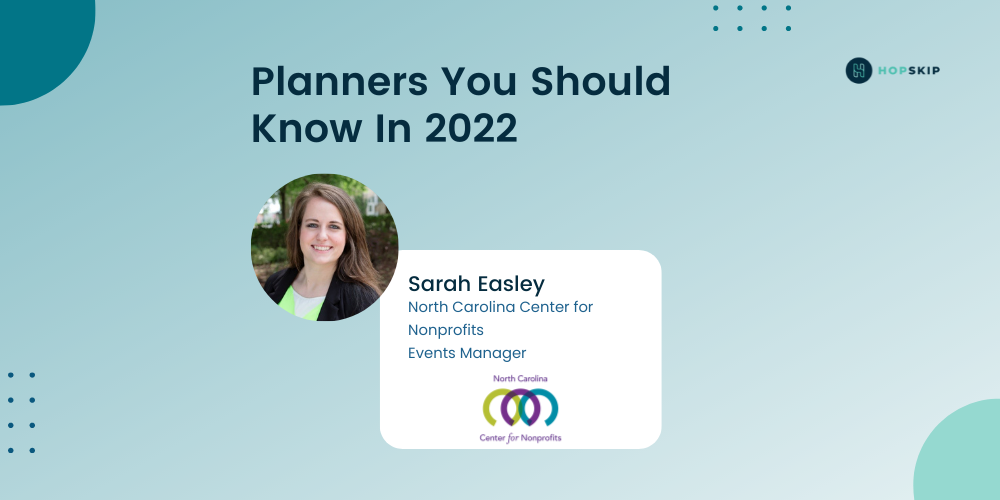This post is part of the HopSkip Planner Spotlight Series where HopSkip spotlight's planners across the industry to bring awareness of how they adapted to COVID-19, communicating and lessons learned and sharing how they are viewing the meetings and events industry in a post-pandemic world.
Name: Sarah Easley
Company Name: North Carolina Center for Nonprofits
Job Title: Events Manager
Years of Experience: 6
How did you get your start in the events industry? What made you pursue this role?
Like a lot of nonprofit folks, I ended up working my way into my current role because a gap needed to be filled. I started as a general admin assistant, moved into marketing, and got my start in events because the same staff person oversaw events and marketing. Over time, I found that I really enjoyed event planning, and with some staff transition, I ended up being the only person with experience in planning our events. Six years later, I've developed a niche role for myself as our events manager, focusing exclusively on event logistics and execution for professional development and training events.
How do you compare planning your first in-person event post-pandemic, to planning meetings/events pre- Covid? What was different and unique? What was similar?
Two things that will always remain constant is that people want to learn, and that people want to network and engage with each other. What's evolved now is that we have to factor in the ability to provide that environment safely. I'm now having to add line items for the costs of PPE into our budgets, ensure that we provide enough square footage in our venue to adequately distance, and communicate our plans for safe gathering.
What was your number one challenge in hosting your first in-person event(s) and how did you overcome it?
We're in the process of planning our first in-person event post-pandemic, so stay tuned!
What is the top learning that you uncovered from the last two years that you’re implementing in your planning process today? (any other tips or tricks you want to share?)
People first, business second. We all have a tendency to get wrapped up in getting our to-do lists completed and achieving goals and metrics, but it's all pointless if we're not taking the time to prioritize the people we're working with.
With hotels short-staffed, and RFP lead time shortening, what is your advice to other planners to overcome these obstacles when requesting hotels for proposals?
Take the time to analyze ways you can be accommodating to their team; a simple "How can I help you with this?" can go a long way to building stronger relationships.
Are you approaching contracting with hotels differently, post-pandemic?
In the nonprofit world, lots of our attendees share rooms with colleagues to cut down on costs. Now post-pandemic I'm having to consider extra sleeping rooms for attendees, and how that might affect our attrition rate if I miss my projections.
What is the biggest area of improvement that you think hotels can make when either responding to your RFPs or during the contract phase of your event?
I've never had a bad contracting experience, but any opportunity you have to be more transparent about what is and isn't possible, take the time to communicate it.
Due to the pandemic, our events community had to evolve, adapt, and grow. Many planners started to embrace new technologies as a result of the pandemic. What new tech are you using today in your planning process as a result?
Through learning how much screen burnout folks are experiencing, all of our virtual events are recorded for later viewing so registrants can process the info when it's most convenient. Decline in online survey responses has made us consider going back to pencil and paper evaluations. In the nonprofit world, meeting people where they are can sometimes mean a less-tech approach.
Since education and relationships are two major pillars in the meetings and events industry, any suggestions on how other planners can learn and network with their peers across the industry?
Being in the nonprofit and association sectors, I joked for years that "I plan meetings, I don't attend them." I then connected with Association Executives of North Carolina (AENC) and began attending their meeting planner roundtables. Finding a like minded group of association planners who understood my exact experiences and headaches was a welcome group of problem solvers and collaborators. Additionally, for anyone pursuing CMP or other designations, look into study groups or others in your continuing education classes for connections. There's no shame in a cold-call LinkedIn request!
This post is part of the HopSkip Planner Spotlight Series where HopSkip spotlight's planners across the industry to bring awareness of how they adapted to COVID-19, communicating and lessons learned and sharing how they are viewing the meetings and events industry in a post-pandemic world.
